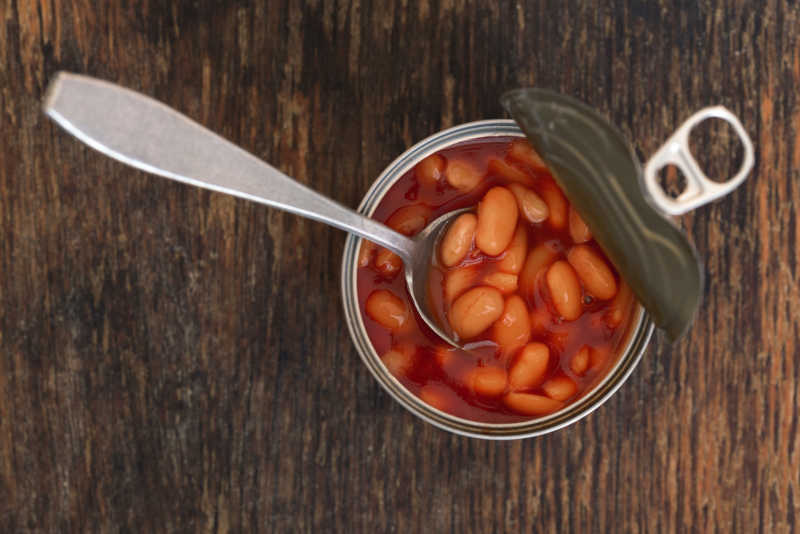If you have leftover canned baked beans and you’re unsure what to do, don’t worry, we’ve been there too! Putting them in the fridge or in the freezer are two excellent choices.
The good news is that you can freeze all types of beans, including fresh, cooked, and canned.
Canned baked beans are a popular dish and a loved plant-based source of protein. They make great individual food or a side dish.
Keep reading to learn more about freezing leftover canned baked beans as well as about the better option: the fridge or the freezer!

Table of Contents
Can You Freeze Canned Baked Beans?
Canned baked beans are a staple favorite: they’re already semi-cooked, seasoned, and ready for consumption. Most of the work is already done so it only remains for you to open and serve them.
However, when you don’t get to use or consume the whole can, it’s good to know how to store the leftovers and prevent food waste.
If you plan to eat them within two to three days, the fridge is completely fine. But, always transfer the leftovers into a glass or plastic container.
Never keep them in the can which has already been opened. If you don’t plan to use them within that period, it’s best to freeze them.
In this way, they will stay tasty and safe for consumption for up to six months. Don’t forget to remove the beans from the can and transfer them into a freezer-safe container or a bag.
Before this step, you can also strain and rinse the beans.
Fill the bag or container with water to fully immerse the beans. Close the bag/container well and label them with the storing date.
Don’t overfill the bags to maximize the freezing process and prevent the beans from sticking to each other.
When you want to use a portion, take it out of the freezer and thaw it in the fridge, at room temperature, or in the microwave. Strain them and use them in a recipe.
How to Freeze Canned Baked Beans?
When freezing canned baked beans, it’s essential to know the do’s and don’ts to maximize the cooling process and ensure the beans taste as delicious as they were when you first opened the can.
Frozen beans are excellent for any recipe which requires dried beans. Feel free to combine them in stews, gravy, soups, and casseroles. They also make a great option for sandwiches, salads, and wraps.
Follow these tips for optimal freezing of beans from a can:
- Never freeze the beans in the can (cans are no longer perfect containers once you open them and they become exposed to air)
- Rinse and strain the beans before you put them in the freezer-safe container or a bag
- Avoid overfilling the bag/container to prevent the beans from sticking to each other and going mushy
- Pack the beans in portions: this way, they’ll freeze faster and they’ll thaw quicker
- Don’t forget to write the date of freezing on the bag/container (in the freezer, you prolong their safety and taste for up to six months)
- If you want to freeze them for a longer period of time, a deep freezer is the best option
- Of course, the longer the beans are frozen, the higher the risk of a decline in their taste and texture and you may also spot a change in the beans’ color (they tend to darken)
- To thaw the frozen beans, take them out the night before planning to use them and leave them to thaw in the fridge overnight or in the microwave using the defrost function. For the latter option, you don’t need to thaw them
- Avoid refreezing the canned beans several times to lower the risk of bacteria and the texture becoming mushy
Can You Put Canned Baked Beans in the Fridge?
If you plan to consume the leftovers within three to four days, you can keep them in the fridge. But, though it may seem convenient to leave them in the can and cover them, it’s best to avoid it.
Instead, the USDA notes that it’s best to place the beans in a glass or plastic container. This is due to beans’ low acidity which makes them more prone to perishing than canned foods with higher acidity.
When stored improperly, the beans may go bad. Here are some of the signs which could help you determine if the beans are unsafe for consumption:
- See the date of packing: if it’s long past it, the beans may not be suitable for consumption
- If you notice leakage, like water coming out, the beans aren’t safe for consumption
- If you spot any brown spots on the beans, it could mean some damage to their cells. They won’t be probably as fresh as they were when you froze them
- Any odd and strong smells of beans mean that they’ve probably gone bad and aren’t safe for consumption
Final Thoughts
Canned beans are one of the most practical and tastiest foods ever! They’re not just suitable for a variety of recipes but are also freezer-friendly.
With only a couple of steps, you no longer need to throw away leftover beans. You just need to transfer them into a proper container or a bag and the freezer will maintain them safe and tasty for up to six months.
If you plan to eat the beans within three to four days, the fridge is a great storage area. But, don’t be tempted to keep them in the can: always transfer them to a container.
Cans may be ideal containers when closed, but once they’re opened, the air causes a lot of changes and this increases the risk of spoilage.
